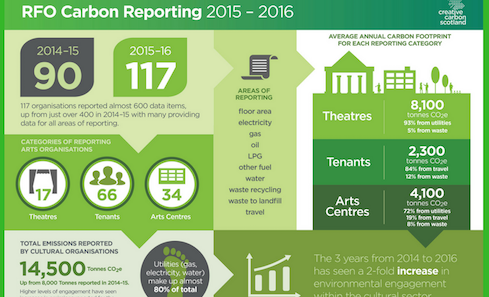Published: 21 Jun 2017
Scotland’s arts, screen and creative industries show increased levels of confidence in carbon reporting and embracing of environmental responsibilities, a new report published by Creative Carbon Scotland today reveals

Since 2014, environmental data – including carbon emissions associated with travel, energy and waste – has been submitted as part of the annual reporting process for Creative Scotland’s Regularly Funded Organisations, becoming a compulsory requirement in 2015 –16.
Over the three years for which reports have been submitted the quality of the data provided has improved substantially, reflecting increasing environmental confidence and carbon literacy in the sector.
In 2015-16, significantly more organisations submitted carbon emissions information, with 117 reporting compared to the previous year’s figure of 90 and a 31% increase in the amount of data reported.
This increase in reporting has also increased the overall reported carbon footprint from 8,000 tonnes CO2e in 2014-15 to 14,500 tonnes CO2e in 2015-16. This isn’t because there was a sudden rise in carbon emissions, but because of better and more confident reporting by the larger number of organisations. Such a rise is comparable with other sectors which have introduced carbon reporting and is likely to continue until reporting is well-established.
In particular, the reporting process gathered more data in 2015-16 and more of the data was based on actual recorded figures rather than estimates. As a result the figures from the reporting can be considered more accurate and relevant for identifying areas where future carbon reductions can best be achieved.
Theatres reported the largest overall emissions figures, with around 8000 tonnes of CO2e, comparing with 4000 tonnes from Art Centres and 2300 from organisations who rent their working spaces.
73% of the data from theatres were actual figures, while from art centres and tenants 64% and 46% respectively were actual. As tenants often have little or no involvement in the payment of utilities, reporting inevitably becomes more estimate-based and reporting rates are lower.
Ben Twist, Director of Creative Carbon Scotland said: “It’s very encouraging to see the increasing sophistication, consistency and engagement of cultural organisations in reporting their carbon emissions. In particular, the increase in overall data submitted, and the proportion of data derived from actual rather than estimated figures, highlights the commitment these organisations have to their sustainability goals. With better and more detailed information we can make better decisions on how best to help Scotland’s cultural community continue their hard work in this area.”
Kenneth Fowler, Director of Communications at Creative Scotland added: “Creative Scotland welcome this report from Creative Carbon Scotland and we thank all the organisations who have contributed to it by recording and submitting their data. It’s great to see that, as a cultural sector, we are taking our carbon reduction responsibilities seriously and this report is testament to that. It also enables us all to make informed decisions about how we operate in the future, so we can continue to minimise and reduce our environmental impact and be as environmentally sustainable as possible across the arts, screen and creative industries.”
This year’s data will help the sector move on to stage two of the programme when Creative Carbon Scotland will be helping organisations with Carbon Management Planning to reduce emissions relating to their future projects. CCS will continue to support RFOs to improve reporting levels and to make the most of the information gathered to benefit their organisations and sustainability ambitions.
View the full report on Creative Carbon Scotland's website.
Creative Carbon Scotland is a Scottish Charitable Incorporated Organisation (Reg Charity No. SCO24687) initiated by the Edinburgh Festivals, the Federation of Scottish Theatre and the Scottish Contemporary Art Network and supported by Creative Scotland and the City of Edinburgh Council.
Creative Carbon Scotland was formed in 2011 to work across the arts and culture in Scotland, aiming to get the sector thinking about climate change and environmental sustainability, harnessing its influence with its large audiences to change public attitudes and opinion and running itself as sustainably as possible. CCS provides training, advice and practical support to arts and cultural organisations throughout Scotland.
Creative Scotland is the public body that supports the arts, screen and creative industries across Scotland, distributing funding from the Scottish Government and National Lottery. In its 10 year plan 2014-24, Creative Scotland updated its environment policy and introduced the Environment Connecting Theme which runs through all of its work and funding. As part of this, Regular Funded Organisations, a network of organisations across the country which form an important part of Scotland’s cultural sector and are supported with three year funding, were required to report their carbon emissions as part of an annual statistical survey each year from 2015-16 onwards: previously reporting had been voluntary.
For any further questions please contact info@creativecarbonscotland.com or call the Creative Carbon Scotland office on 0131 529 7909.